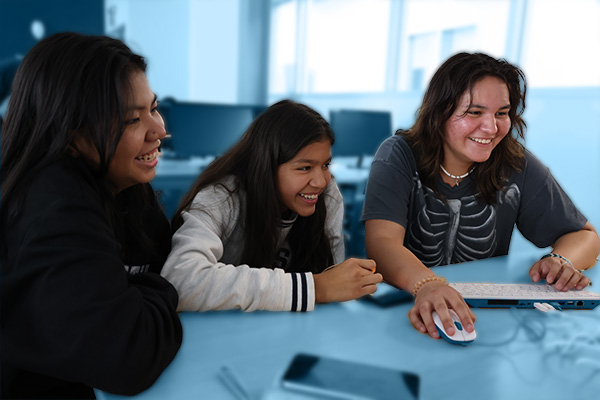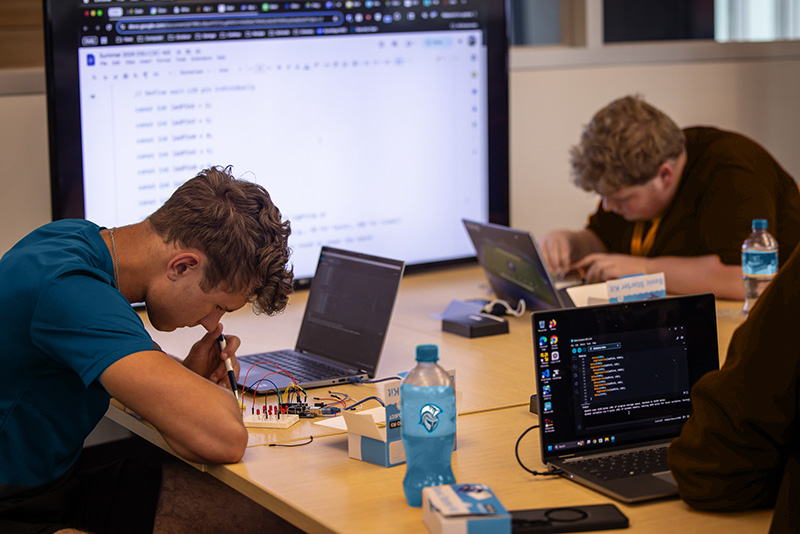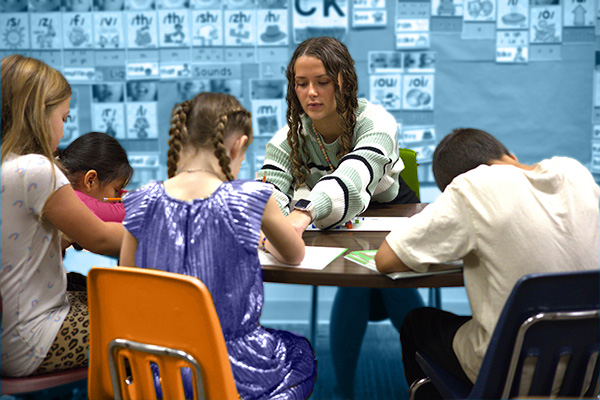Dual Credit
Get your head start at Dakota State University
South Dakota high school juniors and seniors can begin their college career early through DSU's dual credit program. At a discounted rate of $78.48 per credit hour, you’ll earn college credits that also count toward your high school diploma.
Courses are taught by university faculty and offered online, on DSU’s campus, or at your high school. Whether you're earning general education credits or exploring a subject, DSU’s dual credit options offer a strong academic foundation. Credits transfer to most colleges and universities.
No matter your path, DSU’s dual credit programs help you get ahead, save you money, and allow you to explore college-level learning early.

Gateway Certificates
Explore your future with DSU’s Gateway Certificates. These three to four course programs let you experience university-level learning in areas like business, digital tech, health sciences, STEM, and education. Offered online, on campus, or through your school district, gateway provides a flexible way to discover your interests and prepare for what’s next.

Governors Cyber Academy
Jump-start your future with DSU’s Governors Cyber Academy. This dual-credit program lets you explore high-demand fields like cybersecurity, computer science, AI, and network security. Take flexible online courses, earn college credit and digital badges, and even complete the first year of a DSU cyber degree while still in high school.

Cyber Apprenticeship Pathway
Gain real-world experience and earn college credit through DSU’s Cyber Apprenticeship Pathway. This hands-on program connects South Dakota high school students with industry mentors and faculty experts, combining online coursework with on-the-job training. Build valuable skills in cybersecurity, AI, networking, and more.

Paraprofessional Apprenticeship Pathway
The Paraprofessional Pathway allows high school students to earn college credit while working part-time in their own school district. Through online courses and hands-on experience, students gain valuable skills and a head start on a teaching career. Participants upon completion can earn a 12-credit Gateway to Teacher Education Certificate.

Standard dual credit
Whether you're a high school junior exploring college-level courses or a senior earning credits before graduation, Dakota State University offers flexible dual credit options to fit your goals. You can take individual courses for both high school and college credit, based on your interests and schedule. Classes are available online, on campus, or at your high school, depending on your grade level and availability.
Getting started
- High school junior eligible to enroll in a high school in South Dakota who meets one of the following requirements:
- earn a cumulative GPA of at least 3.50 on a 4.0 scale; or
- rank in upper one-third of their graduating class; or
- earn an ACT composite score of 24 reflective of the 70% percentile (or
- equivalent SAT score of 1180)
- High school senior eligible to enroll in a high school in South Dakota who meets one of the following requirements:
- earn a cumulative GPA of at least 3.25 on a 4.0 scale; or
- rank in the upper one-half of their graduating class; or
- earn an ACT composite score of 21 reflective of the 50% percentile (or
equivalent SAT score of 1080)
- High School junior/senior eligible to enroll in a high school in South Dakota who meets all of the following Undergraduate admissions requirements:
- ACT composite score of 21 (or equivalent SAT score of 970); and
- successful completion of coursework Requirements:
- Four Years of English
- Three years of advanced mathematics
- Three years of laboratory science
- Three years of social studies
- One year of fine arts
- High School junior or senior eligible to enroll in a high school in South Dakota who meet the benchmark scores on one of the assessments listed below:
- Smarter Balanced – Score Level 3 on the English language arts & mathematics 11th grade assessments
- PreACT exam score of 24
- ACCUPLACER Next Generation (QAS – Score of 255 and writing score
of 263 or higher).
Getting started is simple whether this is your first dual credit course or you’ve taken one before.
Application Opening Dates
-
Spring Semester: Opens November 1st
-
Summer Semester: Opens March 1st
-
Fall Semester: Opens April 1st
First-Time Students
If you’ve never taken a course through an SDBOR university before:
-
You’ll need to create a new account, through the use of a personal email address when signing up (K-12 school emails often have firewalls that block communication).
Continuing Students
If you’ve previously taken a course through an SDBOR university, log in using your university-provided email and password.
If you're currently enrolled in the High School Dual Credit Program and need to make a change to your schedule, fill out the add/drop form and send it to your campus contact.
